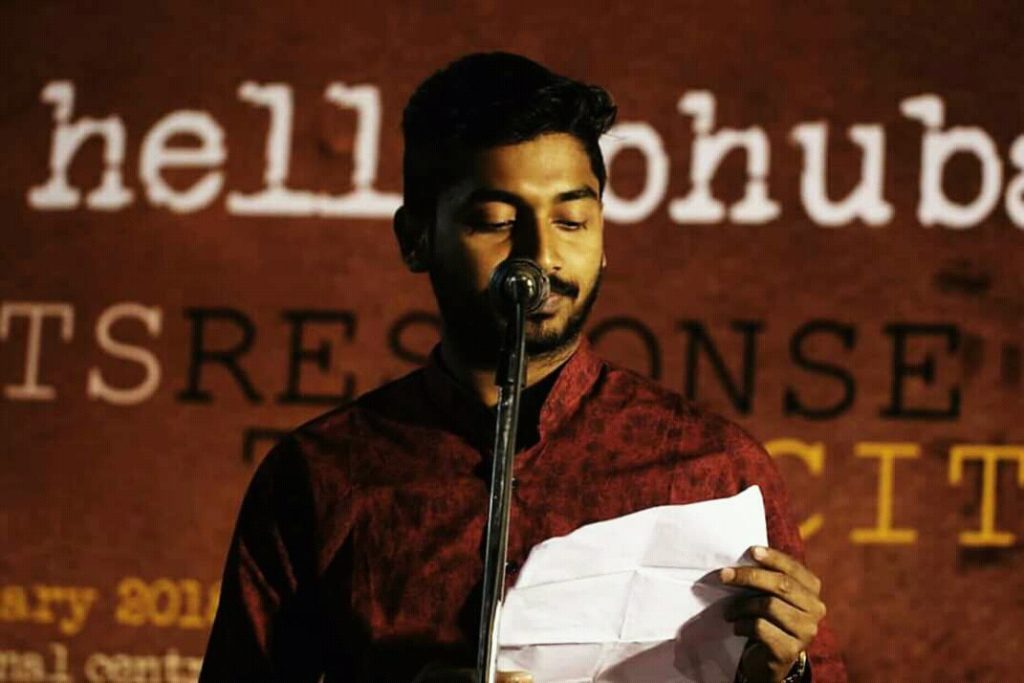Many doctors like Robin Cook and Michael Crichton have earned their name in writing. Some of them draw their themes from their chosen profession, while others even leave their profession for pursuing their new-found call. Working among people, doctors often get a close look at life and they can write insightful stories from their own book of experience. Lok Nath Sahu is a medical student who is passionate about writing. Orissa POST caught up with Lok Nath to know more about his passion and profession.
Lok Nath, who comes from a family of farmers in Pujung, a small hamlet in Kalahandi district, is the first from his village to pursue medicine. Born to Biphala and Bimala Sahu, he cleared his medical entrance exam without attending any coaching classes and enrolled in SCB Medical College and Hospital.
Although Lok Nath wanted to be a doctor, he was also passionate about writing. So, despite academic pressure, he makes sure to find time and pen his feelings in the form of poems and short stories. A final year medical student, he says, “Writing comes naturally to me. I was in Class IX when I wrote my first poem Barsha, a tragic love ballad.”
He adds, “After I wrote Barsha, I got several calls asking me if it was based on a real-life incident. The poem talks of a couple strolling on the roadside on a rainy day, when a speeding car hits them from behind. The girl is seriously injured. When the man gains consciousness, he finds himself in a hospital bed. The poem was published in my school’s annual magazine, Sabuja Sobha. I got a lot of congratulatory messages, including a few from prominent litterateurs. Later, I wrote another poem Maa, which was about the hardships my mother faced in bringing me up. Tears rolled down my mother’s cheek when she read it for the first time. I make sure my mother and brother read all my works before they go for publication, as they are my biggest inspirations.”
Lok Nath says that his mother has encouraged him to write since he was in school. That made him take up writing seriously. With time, his writing matured. “Initially, most of my writings would be themed on love and romance. However, now the themes vary. One of my poems Abhisapta talks about the cursed life of a rape victim. Another poem on the plight of farmers too was appreciated by a lot of people,” says the young author, who doesn’t want to restrict himself to any particular genre.
A few of his widely acclaimed are Aadyanuvuti Ra Madhura Smruti, Prema Ra Gara, Prahelika, Rakta Ra Golapa, Kakara Moti Prema, Sandhya, Baandhabee, while satires like Baba Nkara Leela Odisha Ku Keela, 1st Mb Exam Upakshyana, Mantree Bhagabata, Professor Nka Nata and Director Nka Pain Pade too earned accolades.
Besides, Lok Nath has also written poems on a range of social issues. These include Samaantarala-1, Samaantarala-2, Avisaptaa, Antah-swara, Artanada and Nari Ra Antaratma. His short stories Prema ra Parivasa, Avula Smruti, Daktari Chouki, Rakta ra Abira, Prathama Sparsha-1, Prathama Sparsha-2, Prateekshya and Purnima ra Indu have also been appreciated.
Lok Nath says, “I generally write on weekends. Once a story idea comes to my mind and I manage to draw an outline, I somehow manage to find time to put it on paper.”
Given that Lok Nath comes from a low-income family, he had to struggle a lot to get a loan to pursue a degree in medicine. So, he wants to help students who cannot afford higher education.
At the same time, Lok Nath believes that one shouldn’t stop dreaming even if financial circumstances are adverse. One of his poems Love in Memory Lane, which he had written as an ode to his girlfriend, found a place in poet Gayatri Mavuru’s Vasudha, a compilation of poems. He says, “After listening to my slam poetry in CHIASMA, Gayatri Mavuru praised me and asked: ‘How do you find the most accurate words to express your feelings? Every poem of yours is thought provoking. Keep it up.’”
Lok Nath says that he loves reading the works of other poets and tries to improve his skills. “My favourite poets are Kabi Samrat Upendra Bhanja and Gangadhar Meher. In order to use chhanda (rhyme) and alankaara (ornament) in Odia poetry, I read the works of Bhanja. His poems Laavanyabati and Koti Brahmanda Sundari are my favourites. Besides, Swabhab Kabi Gangadhar Meher’s Tapaswini and Keechaka Badha are also my all-time favourites. I also draw inspiration from the works of Padma Shri Loka Kabi Haldhar Nag,” says Lok Nath, who credits his popularity to social media platforms like Facebook.
“Facebook gave me a platform to write poems and reach out to people who, in turn, encouraged me to continue writing. I still feel happy every time I see someone appreciating my writing on social media or asking when they will get to read my next poem,” adds Lok Nath, who is also a popular face at fests organised by medical colleges, where he regularly recites his slam poems.
“Slam poetry has great potential in emerging as a strong tool of social activism,” says the poet, who was bestowed with the Yuba Kabi Award by Yugajatri Sahitya Sansad.
RASHMI REKHA DAS, OP
